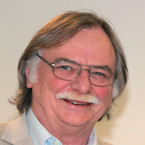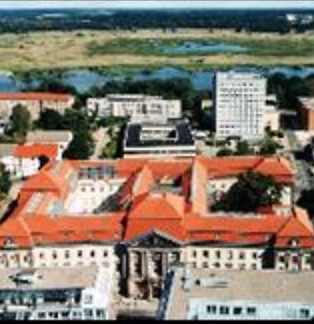Aug. 29, 2003: When 10 central European countries join it next year, the European Union will face its biggest ever enlargement in terms of cultural, scientific, and social diversity. But are scientists and high-tech companies properly prepared to take up opportunities to network across the old borders? Will they be able to communicate effectively in different cultural and social backgrounds? A small university directly on the border between Germany and Poland is preparing its students to meet the challenges of a broader Europe and to operate in eastern markets.
For Now, a Virtual Wall
Frankfurt an der Oder and Slubice are twin cities separated by a virtual wall--the border of the European Union, with its thorough customs and data controls--and a real river--the Oder, which separates Poland from Germany. But for more than 10 years academics have been successfully bridging the Oder, thanks to an initiative of the citizens of Frankfurt an der Oder during the years of German reunification-- the European University Viadrina, which was founded in 1991. From the beginning the new university aimed to be both international and interdisciplinary.
Viadrina is small. It has just three faculties--cultural studies, law, and economics and business administration--and it offers a total of only 15 courses. Students can work towards internationally recognized qualifications, such as bachelor's or master's degrees, but also the German diploma and the Polish licentiate, as well as German and Polish law degrees.
Many of the courses, such as the popular master of business administration (MBA), are modular programmes, which can be followed part time by business professionals from knowledge-based industries who have a natural science background but who lack formal finance and/or and administrative skills.
Prof. Dr. Gesine Schwan
"It is a challenging task to be engaged in teaching and research in this prominent place of European policy", says Prof. Dr. Gesine Schwan, president of Viadrina. "Besides the polyglot environment of an international university it is exciting to tackle multicultural experiences and explore economic facts in different and new contexts. Moreover it is fascinating to see intercultural professional networks growing between east and west."
Marcus Jaunich, a 23-year-old international business administration student from southern Germany, began studying at Viadrina 3 years ago. Aside from personal motivation--his mother comes from Poland--he was looking for a small university able to take good care of its students, while providing a highly international perspective.
Real-World Business Experience
Even before Jaunich obtained his bachelor's degree, he had joined the Viadrina Consulting Group. This student organisation provides a number of professional business consultancy services to both German and Polish companies. The opportunity for regional and cross-border companies to benefit from the expertise in the university is most important for the region on both sides of the Oder, because, with an unemployment rate 10% to 20% higher than elsewhere, and average income per capita 10% to 20% lower, its economy lags far behind the European average.
The Viadrina Consulting Group does not compete with commercial consultants, says Jaunich, who heads the strategy department, because commissions coming from small local companies in Poland and Germany are usually not profitable enough for commercial enterprises to take on. On the contrary: Big commercial consultancies contact the group because of its diverse and interdisciplinary expertise in cross-border and east European issues.
Such close interaction with the real world of business is very much supported by the professors. "We [find] open doors when we need academic advice from our teachers, no matter which faculty they are from," says Jaunich.
Crossing Borders and Disciplines
Indeed, crossover between faculties is at the heart of Viadrina's philosophy. Students of the other faculties are encouraged to attend Faculty of Cultural Studies courses on topics such as "Economic History and Economic Geography", "International Communication", and "Human Genomic Diversity and Ethics". Meanwhile, cultural studies students listen to law and economics lectures.
Crossing the border is easy too. The customs officers are used to seeing the students walking over carrying just their light backpacks, so students need no passports and only have to present their national ID cards now and then. Which is just as well since the university has buildings on both sides of the river and students can choose to live on either bank of the Oder.
Viadrina has a close partnership with the Polish Adam Mickiewicz University in the city of Poznan, about 150 kilometres east of Frankfurt an der Oder. This finds its visible expression in the Collegium Polonicum in Slubice, which is run jointly by both universities. Its modern building is right at the Polish bridgehead of Europe's most frequented bridge to the east.
The Collegium Polonicum
"Under the auspices of both the universities ... we offer also 15 full-study courses and a number of continuation courses both in humanities and natural sciences for our 1500 students", explains Ewa Bielewicz-Polakowska, head of Collegium Polonicum. "Eighty percent of our students are Polish, 20% German. They are enrolled either at the university in Poznan or at the Viadrina in Frankfurt an der Oder."
In total Viadrina has about 4500 students, 30% of them Polish, and 55% from Germany. The remaining 15% is made up of students from 67 different nations from around the world. It's a potential 'tower of Babel', and no student leaves the university without developing skills in at least three languages in addition to their mother tongue. Although the majority of the classes are still held in German, Jaunich completed his bachelor's studies entirely in English.
"If we take the eastern enlargement seriously, we have to start immediately to build language bridges to our neighbours", says Schwan. "The Viadrina model in Frankfurt an der Oder with its Polish-German students and its bicultural educational offerings should not be [a one-off]."
Original

